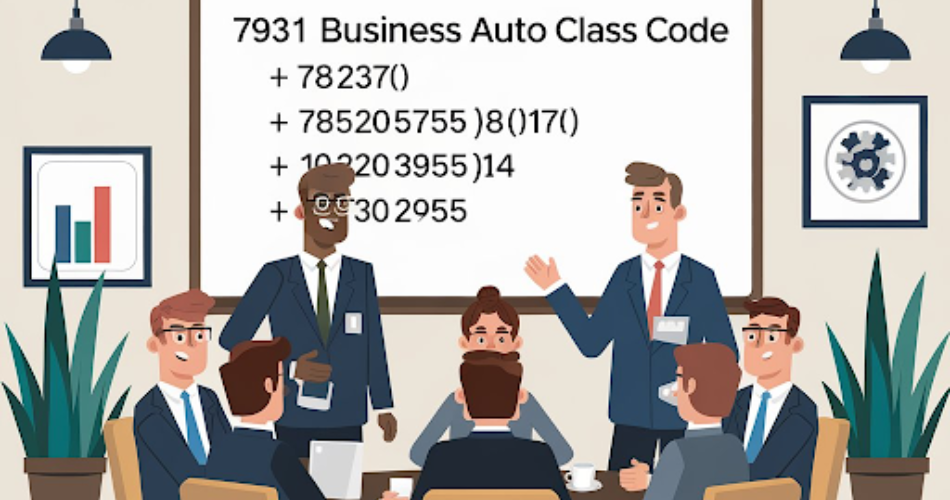Introduction
Navigating the complexities of business insurance can be overwhelming, especially if you’re unfamiliar with the key classifications that affect your coverage and premium rates. For companies in the automobile industry, the 7931 Business Auto Class Code is particularly significant. This classification is vital for determining insurance costs and available coverage for businesses like auto repair shops, car dealerships, body shops, and towing services.
In this detailed guide, we’ll break down the 7931 Business Auto Class Code, explain its importance, and examine how it impacts daily operations and financial planning for auto-related businesses. We’ll also clarify common myths about this classification and provide actionable steps to ensure your business is properly categorized to avoid unnecessary costs and coverage issues.
What is the 7931 Business Auto Class Code?
The 7931 Business Auto Class Code is a specialized designation utilized by insurance providers to categorize businesses within the automotive sector, especially when assessing risks related to workers’ compensation and liability insurance. This classification helps insurers better understand the nature of a company’s operations, allowing them to gauge the potential hazards specific to the automotive industry.
Companies like auto repair shops, vehicle dealerships, towing companies, and auto body repair facilities are often assigned this classification. These industries are inherently exposed to certain risks, such as managing dangerous materials, using heavy equipment, or encountering roadside hazards. As a result, having the correct insurance coverage is vital.
By utilizing the 7931 Business Auto Class Code, insurance providers can accurately determine premiums and craft policies that reflect the specific risks each business faces. For business owners, being aware of this classification is essential to ensure they have the right insurance protection in place—providing the coverage they need without overpaying.
The Importance of the 7931 Business Auto Class Code
Understanding the 7931 Business Auto Class Code plays a crucial role in determining insurance costs and the scope of coverage for businesses involved in the auto industry. This classification serves multiple purposes, making it essential for businesses to get it right. Let’s explore the key reasons why this code is significant:
Accurate Risk Evaluation
One of the core functions of the 7931 Business Auto Class Code is to help insurance providers assess the risk levels associated with different auto-related businesses. Each type of operation—whether it’s a towing service, an auto repair shop, or a vehicle dealership—faces distinct risks. For example, towing companies may encounter roadside hazards and vehicle accidents, while auto body shops might deal with risks like handling hazardous materials or operating heavy machinery.
This classification allows insurers to gauge the probability of claims being made, which directly impacts the calculation of premiums. Businesses that are considered high-risk, such as those with frequent exposure to accidents or dangerous equipment, often face higher premiums. Conversely, companies with lower risk profiles are more likely to receive reduced rates.
Tailored Insurance Solutions
Another key benefit of the 7931 Business Auto Class Code is its ability to facilitate customized insurance coverage. Instead of being locked into a generic policy, businesses can receive coverage that specifically addresses the unique risks they face. This not only ensures adequate protection but also prevents overpayment for coverage that’s not necessary for your business.
For instance, an auto dealership might need specialized insurance for test-driving vehicles and protecting inventory, while an auto repair shop would require coverage that focuses on liability related to repairs and worker injuries. Customized policies can give businesses peace of mind, knowing they are protected in the areas that matter most.
Ensuring Compliance with Regulations
Properly classifying your business under the 7931 code is also vital for regulatory compliance. Misclassification could lead to inadequate coverage, which may leave your business exposed to financial penalties, legal issues, or costly claims. Ensuring your business falls under the correct classification helps you stay within the boundaries of industry regulations, avoiding legal complications and potential financial losses.
Accurate classification not only helps protect your business in the event of a claim but also shows that your company is operating responsibly and in accordance with the law.
Strategic Financial Planning
Having a clear understanding of how the 7931 Business Auto Class Code influences your insurance premiums can significantly impact your financial planning. Knowing the factors that affect your premiums allows you to budget more effectively, especially for small businesses where managing expenses is critical for maintaining profitability.
By staying on top of your classification and ensuring it accurately reflects your current business activities, you can avoid unexpected premium hikes and better forecast future insurance costs. This foresight enables smoother financial operations and helps businesses prepare for long-term growth.
How the 7931 Business Auto Class Code Influences Insurance Premiums
The 7931 Business Auto Class Code is a crucial factor in determining the cost of your business auto insurance. By understanding how this classification affects your insurance premiums, you can make informed decisions about coverage tailored to your business’s needs. Let’s explore the key ways this code impacts your premium rates and coverage options:
Risk-Based Premium Calculations
The 7931 Business Auto Class Code is instrumental in evaluating the risk associated with your specific business operations. Companies with greater exposure to risk, such as those that handle heavy machinery or perform high-risk tasks like welding, will typically face higher premiums. For instance, an auto repair shop that engages in complex mechanical work may incur higher costs compared to a car dealership focused primarily on sales.
Insurers utilize the 7931 classification in combination with your claims history to determine appropriate premium levels. Businesses with a higher frequency of claims or a greater likelihood of future incidents are often subject to increased insurance costs. This helps insurers balance the potential financial risks involved in providing coverage.
Tailored Coverage Based on Business Needs
The 7931 Business Auto Class Code doesn’t just affect the premium; it also plays a role in shaping the type of insurance coverage offered. Businesses within the automotive industry often require customized policies to address their specific risk factors. For example, a towing company may need protection for accidents and roadside assistance liability, while a repair shop might require enhanced workers’ compensation to safeguard employees working with dangerous tools or equipment.
This classification allows insurance providers to align your coverage with the operational risks of your business, ensuring that you receive comprehensive protection without paying for unnecessary extras.
Impact of Claims History on Premium Costs
Your company’s claims history is another key factor in determining insurance costs. If your business has filed frequent or expensive claims in the past, insurers may classify you as a higher risk, leading to higher premium rates. Insurance providers assess your claims history alongside the 7931 Business Auto Class Code to evaluate your overall risk profile.
Businesses with fewer claims or a history of minimal incidents can enjoy more favorable premiums and improved coverage options. Maintaining a clean claims record is a strategic way to reduce insurance expenses over time.
Types of Businesses Covered Under the 7931 Business Auto Class Code
The 7931 Business Auto Class Code encompasses various businesses operating within the automotive sector. Below are some examples of companies that typically fall under this classification:
Auto Repair Shops
Auto repair facilities offering services like engine repairs, oil changes, brake maintenance, and other essential vehicle services often fall within the 7931 Business Auto Class Code. These operations face a range of risks, such as working with heavy machinery, exposure to hazardous substances, and ensuring employee safety. These factors are considered when designing appropriate insurance coverage for such businesses.
Car Dealerships
Car dealerships that sell new and used vehicles, along with offering related services such as test drives and vehicle storage, are also categorized under this code. Dealerships deal with specific risks, including the liability that comes with test-driving vehicles, managing customer interactions, and handling vehicles, all of which require tailored insurance policies to manage effectively.
Auto Body Shops
Businesses specializing in bodywork, such as collision repairs and vehicle repainting, are classified under the 7931 code. These companies manage unique risks, such as working on damaged vehicles, operating welding and painting equipment, and managing hazardous materials. Specialized insurance coverage is necessary to mitigate these risks.
Towing Services
Towing companies that offer roadside assistance or vehicle recovery services also fall under the 7931 Business Auto Class Code. Due to the nature of towing operations, which often involve navigating road hazards and recovering vehicles involved in accidents, specialized insurance coverage is critical to account for these inherent risks.
Debunking Common Myths About the 7931 Business Auto Class Code
Despite its significance, the 7931 Business Auto Class Code is often misunderstood. Let’s clarify a few of the most common myths surrounding this classification:
Misconception 1: All Auto Businesses Are Categorized the Same
A prevalent myth is that every business in the automotive industry is classified the same. This isn’t true. While numerous businesses within the auto sector may fall under the 7931 Business Auto Class Code, each one is evaluated based on its unique operations and risk profile. For instance, the risks faced by a towing service are very different from those of a car dealership, and these differences are reflected in their classifications and insurance premiums.
Misconception 2: A Higher Class Code Equals Higher Risk
Another common misunderstanding is that a higher class code always indicates a higher risk. However, class codes serve as tools for categorizing businesses based on their activities and associated risks, rather than directly signifying the level of risk. While class codes assist insurers in assessing businesses, they do not offer an absolute measure of risk.
Misconception 3: Class Codes Never Change
Some people believe that once a class code is assigned, it remains unchanged. In reality, class codes can shift over time, either due to evolving industry standards or changes in how a business operates. It’s essential to review your classification regularly to ensure it accurately reflects your business activities and remains current.
Ensuring Accurate Business Classification for Insurance Purposes
Proper classification under the 7931 Business Auto Class Code is essential to securing the right insurance coverage for your business. Misclassification can lead to inadequate protection or higher premiums. Follow these tips to ensure your business is accurately classified:
Seek Guidance from Industry Experts
Collaborating with a knowledgeable insurance professional is key to navigating the complexities of business classification. These experts can assist you in identifying the correct class code, ensuring your insurance policy accurately reflects the nature of your operations.
Regularly Assess and Update Your Classification
As your business evolves, your operations may shift. It’s important to periodically review your class code to make sure it remains relevant and that your coverage matches your current risk exposure. Proactive management of your classification ensures you are adequately protected.
Thoroughly Understand Your Business Activities
A detailed understanding of your day-to-day business activities is vital when selecting the appropriate class code. By having a clear picture of the services or products your business provides, you can avoid costly mistakes such as underinsurance or gaps in coverage.
Conclusion: The Importance of the 7931 Business Auto Class Code
The 7931 Business Auto Class Code is a crucial component for enterprises within the automotive sector. It significantly influences your insurance rates, the types of coverage available, and your overall risk assessment. Gaining a comprehensive understanding of this classification is vital. By ensuring your business is accurately categorized, you can mitigate financial risks and prevent overpayment for unnecessary insurance coverage.
Keep up-to-date with breaking news and updates on Hawaiitimes
